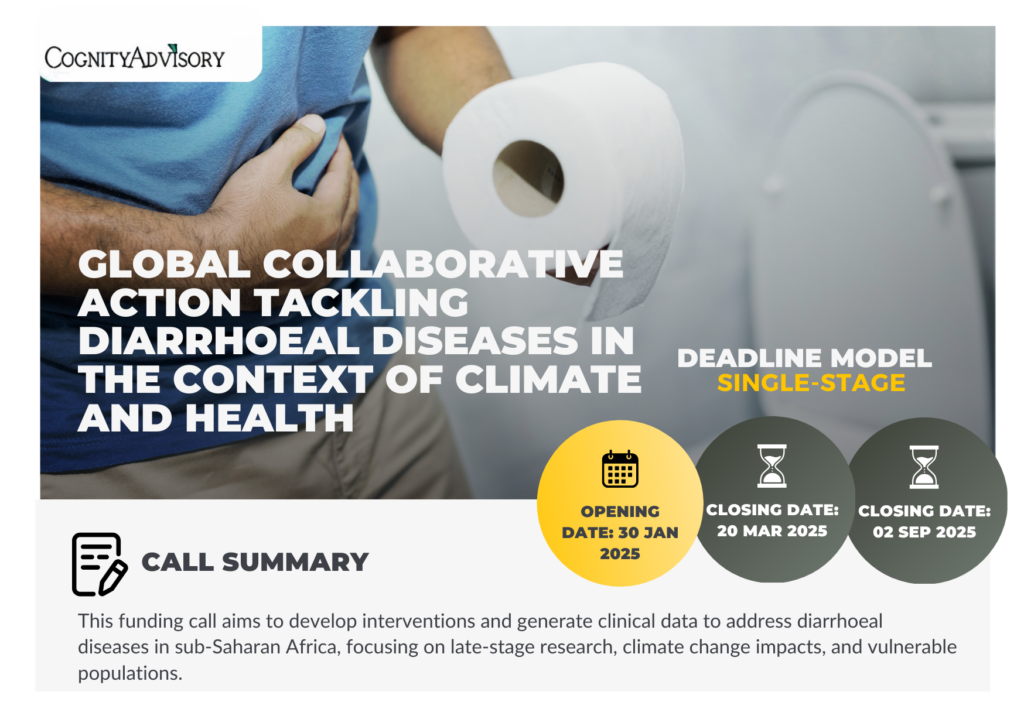HORIZON-JU-GH-EDCTP3-2025-04-CH-01-two-stage
General information
Programme
Horizon Europe (HORIZON)
Call
Type of action
HORIZON-JU-RIA HORIZON JU Research and Innovation Actions
Type of MGA
HORIZON Action Grant Budget-Based [HORIZON-AG]
Forthcoming
Deadline model
two-stage
Planned opening date
30 January 2025
Deadline dates
20 March 2025 17:00:00 Brussels time
02 September 2025 17:00:00 Brussels timeTopic description
Expected Outcome:
Background
At the current 8-year mean heating of 1,14 degree Celsius pre-industrial levels, climate change is undeniably impacting health: over half of known human pathogenic diseases can be aggravated by climate change, 24% of all estimated global deaths are linked to the environment and WHO estimates that climate change, between 2030 and 2050, will cause approximately 250 000 additional deaths per year from malnutrition, malaria, diarrhoeal and heat stress alone. In addition to the health burden, unequal evidence base is also observed, with underdeveloped methods: only ~10% of peer-reviewed publications in 2022 were focusing on Africa and innovative tools integrating climate and health data for modelling are often skewed towards a specific disease and available in HICs. The need for integrated interdisciplinary approaches and the generation of impact evidence is lacking and will be instrumental to inform policy making and adaptation and mitigation options. Furthermore, disruptive and integrated innovations need to be incentivised to foster cross-sector collaboration.
This call focuses on Diarrhoeal diseases (DDs) as part of the Climate and Health related diseases, majority of which are mostly transmitted through excreta-related infections. DDs are preventable and treatable but still represent the third leading cause of death in children 1–59 months of age. Globally, WHO reports nearly 1,7 billion cases of childhood diarrhoeal diseases every year (mostly in South-Asia and sub-Saharan Africa), leading to approximately 1,5 million deaths, of which over 400 000 children under 5 and over 50 000 children aged 5 to 9 years. Diarrhoea is also a leading cause of malnutrition in children under 5 years old. Repeated episodes of severe diarrhoea can lead to malnutrition, stunted growth and impaired cognitive development. DDs contribute to increased risk of death and ill health, diminished opportunities and reduced productivity over a lifetime for millions of people.
Increased temperatures, heavy rainfall or flooding have been associated to increased incidence of diarrhoeal diseases and have been shown to influence the transmission, geographical and seasonal ranges of diarrhoeal diseases. WHO reported projections estimating that climate change will lead to approximately 48 000 and 33 000 deaths per year in 2030 and 2050 respectively in children aged under 15 years.Context-specific evidence generation, vulnerability and adaptation assessments and adequate tools tocombat diarrhoeal diseases are urgently needed in sub-Saharan Africa.
Expected Outcome
Within the scope of diarrhoeal diseases of the Global Health EDCTP3, this topic aims to reduce or manage the potential adverse consequences for diarrhoeal diseases by contributing to at least two of the following expected outcomes, with the first being mandatory:
- Develop interventions to identify and control diarrhoeal diseases through generating late-stage clinical data in sub-Saharan Africa;
- Implementation research combining interventions with current standard of care (including vaccines);
- Generate evidence to evaluate the populations and geographies of most vulnerable to diarrheal diseases, understand the key underlying factors including those related to climate change, and understand the barriers to protect the people affected.
Scope:
Scope
The scope of this call is anchored in the Global Health EDCTP3 SRIA.
The proposals are expected to generate late-stage clinical data evaluating safety, efficacy and clinical utility accelerating the development of novel or existing treatment against DDs or focus on late-stage development of novel or existing diagnostics to detect DDs. The scope limits to the following pathogens: rotavirus, shigella, cholera, enterotoxigenic E. coli, cryptosporidium, and norovirus. Solutions having the potential to reduce AMR are considered in scope. Other DD pathogens are out of scope of this call.
Where appropriate, proposals are encouraged to include implementation research combining interventions with current standard of care (including vaccines), as well as complementary research components that help to improve the understanding on how diarrhoeal diseases are currently influenced by climate and weather and may be further exacerbated by climate change (WHO Technical series on adapting to climate- sensitive health impacts: diarrhoeal diseases[1]).
Multidisciplinary approaches integrating adjacent sectors are strongly encouraged (i.e. nutrition, IPC/WASH). Proposals are to generate clinical data serving new-borns, children, people with co-infections and co-morbidities and other vulnerable and neglected populations at risk in SSA when relevant.
Applicants are expected to provide methodologies for translating research findings into public health/climate practice and policy guidelines.
When relevant, proposals should clearly describe the desired target product profile. Applicants need to concisely describe any prior relevant research findings and explain how the proposal builds on available data (including data generated in scope of earlier EDCTP programmes if available). Full details of the development milestones, including specific go/no-go criteria for the implementation of the proposed clinical trial(s) must be included, as well as specific plans for the subsequent regulatory approval process, which should aim at obtaining relevant market authorisation. and an access strategy that will allow patients in low- resource settings to access the final product.
The applicants are encouraged to consider new adaptive trial designs and lessons learnt from COVID-19 potentially allowing for shorter development timelines.
Proposals should engage communities and relevant stakeholders, most notably (local) key opinion leaders, researchers, health care professionals, policy makers, public health authorities and end-users. Applicants should provide methodologies for translating research findings into public health practice and policy guidelines.
Applicants are reminded of the expectation that proposals should come from research consortia with a strong representation of institutions and researchers from sub-Saharan African countries, including involvement of Franco/Lusophone countries, if possible. Collaboration with other international research groups with relevant experience is very much encouraged. Applicants are also reminded of the expectation of reaching out to organisations in countries with relatively lower research capacities.
All projects funded under this topic are strongly encouraged to participate in networking and joint activities, such as external conferences, workshops or symposiums for an exchange of knowledge, and bestpractices with external collaborators.
